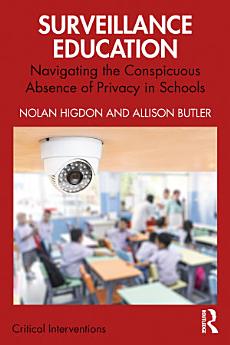Surveillance Education: Navigating the Conspicuous Absence of Privacy in Schools
À propos de cet e-book
In our era of surveillance capitalism, digital media technologies are ever more intertwined into the educational process. Schools are presented with digital technologies as tools of convenience for gathering and grading student work, as tools of support to foster a more equitable learning environment, and as tools of safety for predicting or preventing violence or monitoring mental, emotional, and physical health. Despite a dearth of evidence to confirm their effectiveness, digital data collection and tracking is often presented as a way to improve educational outcomes and safety. This book challenges these fallacious assumptions and argues that the use of digital media technologies has caused great harm to students by subjecting them to oppressive levels of surveillance, impinging upon their right to privacy, and harvesting their personal data on behalf of Big-Tech. In doing so, the authors draw upon interviews from K–12 and higher education students, teachers, and staff, civil rights and technology lawyers, and educational technological programmers. The authors also provide practical guidance for teachers, administrators, students, and their families seeking to identify and combat surveillance in education.
This urgent, eye-opening book will be of interest to students and educators with interests in critical media literacy and pedagogy and the sociology of technology and education.
À propos de l'auteur
Nolan Higdon is a founding member of the Critical Media Literacy Conference of the Americas, Project Censored National Judge, author, and lecturer at Merrill College and the Education Department at the University of California, Santa Cruz, USA. Higdon’s areas of concentration include podcasting, digital culture, news media history, propaganda, and critical media literacy. All of Higdon’s work is available at Substack (https://nolanhigdon.substack.com/). He is the author of The Anatomy of Fake News: A Critical News Literacy Education (2020) and Let’s Agree to Disagree: A Critical Thinking Guide to Communication, Conflict Management, and Critical Media Literacy (Routledge, 2022), and co-author of The Media and Me: A Guide to Critical Media Literacy for Young People (2022). Higdon is a regular source of expertise for CBS, NBC, The New York Times, and The San Francisco Chronicle.
Allison Butler is a Senior Lecturer and Director of the Media Literacy Certificate Program in the Department of Communication at the University of Massachusetts Amherst, USA. She is also Co-Director of the Mass Media Literacy non-profit organization, where she develops and runs training programs for teachers covering critical media literacy in K–12 schools, Vice President on the Board of the Media Freedom Foundation, and a spokesperson for Project Censored. Her research focuses on critical media literacy and critiques of surveillance technologies in education. She is the author of Educating Media Literacy: The Need for Teacher Education in Critical Media Literacy (2020), and co-author of Critical Media Literacy and Civic Learning: Interactive Explorations for Students and Teachers (2021) and The Media and Me: A Guide to Critical Media Literacy for Young People (2022).








